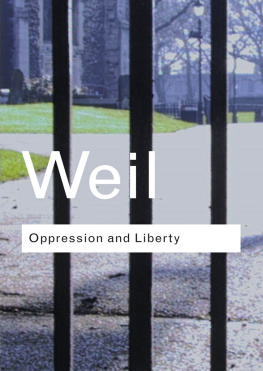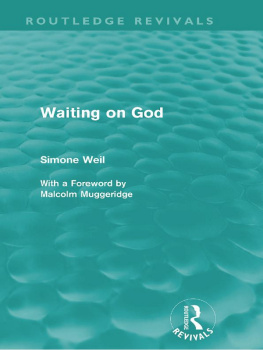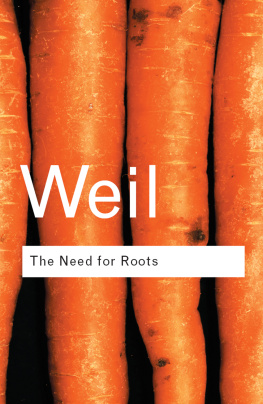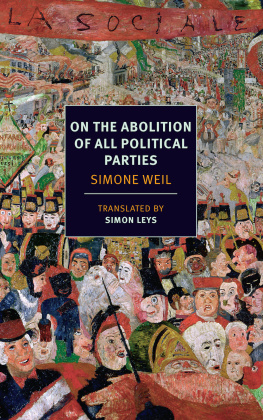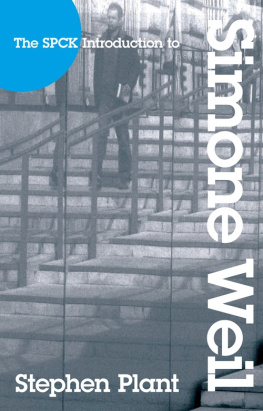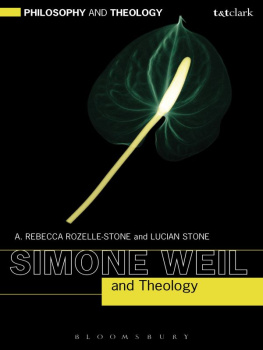Oppression and Liberty
The best spiritual writer of this century.
Andr Gide
What makes this book worth reading and it is extremely readable is the clarity and force of the style and the sincerity of the emotions which led Simone Weil to reflect on political philosophy. It is a book full of interest and insight, penetrating observations and stimulating suggestions with, even in its most pessimistic passages, a humane faith and sincerity that reinforce the readers confidence in the possibility of a humanistic, rational and liberal order of society.
Times Literary Supplement
Simone
Weil
Oppression and Liberty
Translated by Arthur Wills and John Petrie

Oppression et libert was first published 1955
by Gallimard, Paris
English edition first published 1958
by Routledge & Kegan Paul
First published in Routledge Classics 2001
by Routledge
11 New Fetter Lane, London EC4P 4EE
29 West 35th Street, New York, NY 10001
Routledge is an imprint of the Taylor & Francis Group
This edition published in the Taylor & Francis e-Library, 2004.
Translation 1958 Routledge & Kegan Paul
All rights reserved. No part of this book may be reprinted or reproduced or utilised in any form or by any electronic, mechanical, or other means, now known or hereafter invented, including photocopying and recording, or in any information storage or retrieval system, without permission in writing from the publishers.
British Library Cataloguing in Publication Data
A catalogue record for this book is available from the British Library
ISBN 0-203-167635 Master e-book ISBN
ISBN 0-203-262549 (Adobe eReader Format)
ISBN 0415255600 (hbk)
ISBN 0415254078 (pbk)
ISBN 9781134521814 (epub)
C ONTENTS
PROSPECTS
Are we heading for the proletarian revolution?
I would not give a farthing for
the mortal whom empty hopes can
set afire.
SOPHOCLES . Ajax, 4778
The long-foreseen moment has arrived when capitalism is on the point of seeing its development arrested by impassable barriers. In whatever way we interpret the phenomenon of accumulation, it is clear that capitalism stands essentially for economic expansion and that capitalist expansion has now nearly reached the point where it will be halted by the actual limits of the earths surface. And yet never have there been fewer premonitory signs of the advent of socialism. We are in a period of transition; but a transition towards what? No one has the slightest idea. All the more striking, therefore, the carefree security with which we settle down in this transition period as though it were a definite stage, so much so that considerations concerning the crisis of the system have almost everywhere become commonplaces. Certainly, we can always go on believing that socialism will arrive the day after tomorrow, and make a duty or a virtue of this belief; so long as we go on taking, day by day, the day after tomorrow to mean the next day but one after today, we shall be sure not to be disappointed; but such a state of mind is difficult to distinguish from that of those worthy people who believe, for instance, in the Last Judgment. If we want to traverse this sombre age in manly fashion, we shall refrain, like the Ajax of Sophocles, from letting empty hopes set us afire.
Throughout history men have struggled, suffered and died to free the oppressed. Their efforts, when they did not remain sterile, have never led to anything except the replacing of one oppressive rgime by another. Marx, who had observed this, thought he was able to demonstrate scientifically that things were different in our day, and that the struggle of the oppressed would now lead to a true emancipation, not to a new oppression. It is this idea, which we have preserved as an article of faith, that we need to examine afresh, unless we mean systematically to close our eyes to the events of the past twenty years. Let us spare ourselves the disillusionments of those who, having fought for Liberty, Equality, Fraternity, discovered one fine day that what they had got was, as Marx says, Infantry, Cavalry, Artillery. But they at any rate were able to draw some lesson from the surprises of history; sadder is the lot of those who perished in 1792 or 1793, in the street or on the frontiers, fully convinced that with their lives they were purchasing the freedom of mankind. If we are to perish in the battles of the future, let us do our best to prepare ourselves to perish with a clear vision of the world we shall be leaving behind.
The Paris Commune was an example not only of the creative power of the working-class masses in movement, but also of the fundamental impotence of a spontaneous movement when it comes to fighting against organized forces of repression. August 1914 marked the bankruptcy of proletarian mass organizations, both on the political and the trade-union planes, within the framework of the system. From then onwards it became necessary to abandon once and for all the hopes placed in this mode of organization not only by the reformists, but by Engels. On the other hand, October 1917 ushered in new and radiant prospects. At last the means had been found of combining legal with illegal action, the systematic labours of disciplined militants with the spontaneous seething of the masses. All over the world communist parties were to be formed to which the Bolshevik party would pass on its knowledge and technique; they were to replace social democracy, already described by Rosa Luxemburg, in August 1914, as a stinking corpse, and very soon to disappear from the stage of history; and they were to seize power within a very short time. The political rgime set up spontaneously by the workers of Paris in 1871, then by those of St. Petersburg in 1905, was to become solidly entrenched in Russia and so on to embrace the entire civilized world. Of course, the crushing of the Russian Revolution by the brutal intervention of foreign imperialism might blast these brilliant prospects; but, unless such a thing occurred, Lenin and Trotsky were certain of introducing into history precisely this particular series of transformations and not any other.
Fifteen years have elapsed. The Russian Revolution has not been crushed. Its enemies, both abroad and at home, have been vanquished. And yet nowhere on the surface of the globeincluding Russiaare there any soviets; nowhere on the surface of the globeincluding Russiais there any communist party properly so called. The stinking corpse of social democracy has continued for fifteen years to infect the political atmosphere, which is hardly the action of a corpse; if at last it has largely been swept away, this has been the work of fascism, not of the Revolution. The rgime born of October, which had either to expand or perish, has for fifteen years accommodated itself very well to the boundaries set by its national frontiers; its role abroad now consists, as events in Germany clearly demonstrate, in stifling the revolutionary activities of the proletariat. The reactionary bourgeoisie have at last perceived that it has very nearly lost all force of expansion, and are wondering whether they could not now make use of it by arranging defensive and offensive alliances with it with a view to future wars (cf. the

